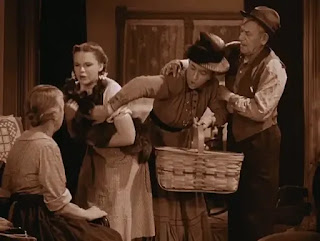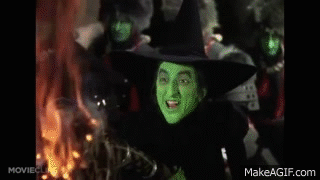In the 1939 film adaptation of The Wizard of Oz, the character Dorothy Gale (played by Judy Garland) experiences several traumatic events that greatly impact her throughout the story. She was extremely mistreated. Just like many of us, Dorothy's trauma stems from people and things in her very own environment at home. Home is always where it starts.
These incidents include being parentless, being bullied by older adults, being lied to, feeling neglected, being forced to deal with strangers, being stalked and harassed, being deceived, and being in constant danger.
Firstly, Dorothy's trauma begins with being parentless. As an orphan living with her aunt and uncle in Kansas, she longs for the comfort and love that only parents can provide. This emotional absence sets the stage for her vulnerability and search for belonging throughout the film.
Since lack of parents can create a sense of loss and abandonment, Dorothy clearly fell vulnerable to emotional distress. This absence of familial support may have contributed to her seeking solace in her pet dog, Toto, as her primary companion.
Additionally, Dorothy is constantly bullied by an older adult, Miss Gulch. Miss Gulch threatens to take away Dorothy's beloved dog, Toto, and intimidates her with her loud and aggressive demeanor. She also threatens to take her Aunt and Uncle's farm when they refused to sign a court order that would allow her to take Toto.
This causing Dorothy significant distress as Miss Gulch owned half the county where Dorothy and her relatives lived, giving her the power to do so. The film starts with Dorothy running from Miss Gulch. As an opening scene this immediately alerts the audience. The power imbalance inherent in this situation further traumatizes Dorothy, as she feels helpless and victimized by an authority figure.
Because of her uncomfortable living situationat home, Dorothy runs away and encounters a fortune teller who manipulates her through deceit. As he begins his sessions with her, he instructs Dorothy to close her eyes. In doing so, her gaurd is immediately let down as the fortune teller slipped the basket in her hands away from her. He took a peak inside the basket to find a picture of Dorothy with her Aunt Em. Aunt Em was wearing a polka-dot dress in the photo. He then instructed Dorothy to reopen her eyes as he began describe a woman in a polka-dot dress. Dorothy instantly recognized the woman as her Aunt Em. As the fortune teller drew her in further and further into his so called abilities Dorothy is convinced.
The fortune teller suggests that Aunt Em is sick because of Dorothy's disobedience, instilling guilt and shame in her.This manipulation causes Dorothy to believe that she is responsible for the difficulties her family is facing, compounding her emotional burden. While the fortune tellers intentions might have been good, lying to an underage child about the health and well-being of a loved one in order to get her to return home was a dastardly tactic.
As she's on her way back home a tornado begins to whirl. Dorothy is left behind in the farmhouse. Why you ask? Well, because admist all the ruckus on the farm to escape the tornado's rampage, Dorothy's family quickly seeks shelter in the storm cellar. Although her Aunt Em helplessly called for Dorothy prior to this to no success. This neglect highlights a sense of abandonment as she finds herself subjected to the uncontrollable forces of nature all alone. The scene amplifies her vulnerability and creates a fear of being left behind or forgotten.
The tornado transports Dorothy to the Land of Oz. This traumatic event separates her from her family and familiar surroundings. Upon arriving in the enchanting Land of Oz, Dorothy is thrust into an unfamiliar environment filled with strangers. She must navigate the unfamiliar societal norms and customs of the Oz residents, which can be disorienting and overwhelming. This situation forces her to adapt to new surroundings hastily, intensifying her sense of vulnerability.
Throughout her journey, Dorothy and her friends are relentlessly hunted, and harassed by the obvious psychopath, the Wicked Witch of the West.
She seeks to retaliate against Dorothy for inadvertently killing her sister, the Wicked Witch of the East.
Like a true narcissist, she also desires possession of Dorothy's Ruby Slippers for herself. She intimidates Dorothy by stalking her and keeping surveillance of her journey through a crystal ball, continuelly communicating threats and attempting to intoxicate Dorothy and companions with poisoned poppies.
As well as sending minions to capture her and her friends. Other forms of torture take place by taunting Dorothy with illusions of her Aunt Em, ordering to have Toto drowned, keeping Dorothy held hostage in her castle and even setting Scarecrow on fire. The constant danger posed by the witch heightens Dorothy's anxiety.
When Dorothy and her companions finally reach the Emerald City and gained an audience with the Wizard, they discover that he was a deceptive and manipulative figure. Not right away of course. He starts their relationship off by intimidating them and calling them names. With every insult he grew more pompous. He ends their first meeting with them agreeing to bring him back the broom stick of the Witch of the West.
The group reluctantly agree to these terms. After escaping the clutches of the evil witch barely with their lives, they return to the wizard who is not pleased to see them. No doubt assuming the Wicked Witch and her henchmen would do away with Dorothy and her friends and he wouldn't have to deal with them again. Dorothy presents him with the broom stick as she expects him to keep the promises he made to them in the original meeting.
However, he attempts to prolong their justice by requesting that they go away and come back the next day after he's given the matter some more thought. This upset Dorothy and her friends. As an argument ensues between the two parties, Toto pulls back the curtain on the fraud. Revealing him to be just an ordinary man and not the mystical all-powerful being they had thought.
He had been using grand illusions to deceive the people of Oz. All his abilities simply smoke and mirrors. This deception and false hope leads Dorothy to question the authenticity of her journey and the promises made to her. She initially believes that the Wizard will grant her wish to return home, only to discover his charade. This realization leaves her feeling disillusioned and deeply disappointed.
Near the end of the film, although promising Dorothy that he would take her home himself on his air baloon, the Wizard once again failed Dorothy and left her in Emerald City, "accidentally". Then, Glinda appeared. The good witch whom she met at the beginning of the film. A light who tried to help guide Dorothy on her way. Besides the fact that she was the one who instigated the tension between Dorothy and the Wicked Witch of the West to begin with. It was Glinda who taunted and teased the Witch of the West and gave Dorothy the Ruby Slippers. With this, she set Dorothy up to be a target of the Witch of the West.
Dorothy was wronged by virtually every other character in the film. Often being met with harsh treatment for seemingly unnecessary reasons. When she awoke from her adventure in Oz she was back to her boring grey life. However, with a new perspective on life and new courage.
















.webp)
.png)
.jpeg)



_1.gif)

_7.gif)



.jpg)



_4.gif)
_2.gif)
_3.gif)